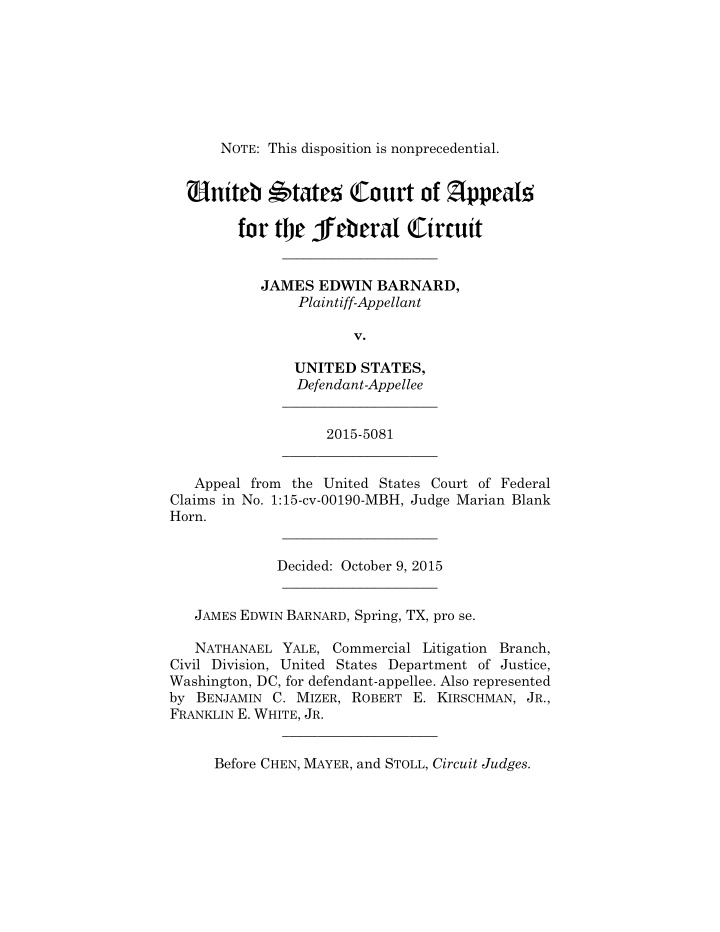



N OTE : This disposition is nonprecedential. United States Court of Appeals for the Federal Circuit ______________________ JAMES EDWIN BARNARD, Plaintiff-Appellant v. UNITED STATES, Defendant-Appellee ______________________ 2015-5081 ______________________ Appeal from the United States Court of Federal Claims in No. 1:15-cv-00190-MBH, Judge Marian Blank Horn. ______________________ Decided: October 9, 2015 ______________________ J AMES E DWIN B ARNARD , Spring, TX, pro se. N ATHANAEL Y ALE , Commercial Litigation Branch, Civil Division, United States Department of Justice, Washington, DC, for defendant-appellee. Also represented by B ENJAMIN C. M IZER , R OBERT E. K IRSCHMAN , J R ., F RANKLIN E. W HITE , J R . ______________________ Before C HEN , M AYER , and S TOLL , Circuit Judges.
2 BARNARD v. US P ER C URIAM . James Edwin Barnard appeals from an order of the Court of Federal Claims (Claims Court) dismissing his complaint for lack of subject-matter jurisdiction. Because he made no claim for money damages against the United States as would be required for subject-matter jurisdiction in the Claims Court, we affirm. B ACKGROUND Mr. Barnard filed a letter and a number of additional documents in the Claims Court. This letter is not styled as a complaint and identifies no legal basis for any relief. It indicates that Mr. Barnard is missing his inheritance and seeks the appointment of a special master to assist him in obtaining it. The Claims Court construed this letter as a com- plaint, which it dismissed sua sponte for lack of subject- matter jurisdiction. Mr. Barnard appeals this dismissal. D ISCUSSION We have jurisdiction over this appeal under 28 U.S.C. § 1295(a)(3). We review the Claims Court’s sua sponte dismissal for lack of subject-matter jurisdiction de novo . Kam-Almaz v. United States , 682 F.3d 1364, 1368 (Fed. Cir. 2012). As did the Claims Court, we assume all facts alleged in Mr. Barnard’s documents to be true and draw all reasonable inferences in his favor. See Erickson v. Pardus , 551 U.S. 89, 94 (2007). Because Mr. Barnard filed his documents pro se , the Claims Court held them to “less stringent standards than formal pleadings drafted by lawyers.” See Haines v. Kerner , 404 U.S. 519, 520-21 (1972). We share the Claims Court’s view that the documents Mr. Barnard submitted are “extremely difficult to follow.” J.A. 16. That court treated Mr. Barnard’s documents as a complaint seeking relief in the form of “assistance from the United States to
BARNARD v. US 3 locate his inheritance, as well as funds and property from various public and private entities, and accounts.” Id. We find this treatment appropriate under the require- ment of lenience toward Mr. Barnard. The Claims Court further found this complaint not to assert any claim for money damages against the United States, as required for jurisdiction. Id. This finding was correct. See United States v. Mitchell , 463 U.S. 206, 216 (1983). Mr. Barnard appears to argue on appeal that he “claim[s his] right to common law jurisdiction and re- fuse[s] statutory jurisdiction and/or admiralty jurisdic- tion.” Appellant’s Br. at 1. This claim fails. The Claims Court is an Article-I court whose jurisdiction is defined by the United States’ limited statutory consent to waive its sovereign immunity. See RHI Holdings v. United States , 142 F.3d 1459, 1461 (Fed. Cir. 1998); 28 U.S.C. § 1491. Because the court that Mr. Barnard chose for his filing has no jurisdiction other than that arising by this statuto- ry consent, his attempt to “claim” some other type of jurisdiction fails. Mr Barnard also alleges new facts on appeal that were absent from his filings with the Claims Court, including averments that he is entitled to money from the Social Security Administration in an amount related to the value of his weight in gold at birth. These facts are not properly before us on review of the Claims Court’s dismissal of his originally filed documents, and we do not consider them. AFFIRMED No costs.
Recommend
More recommend